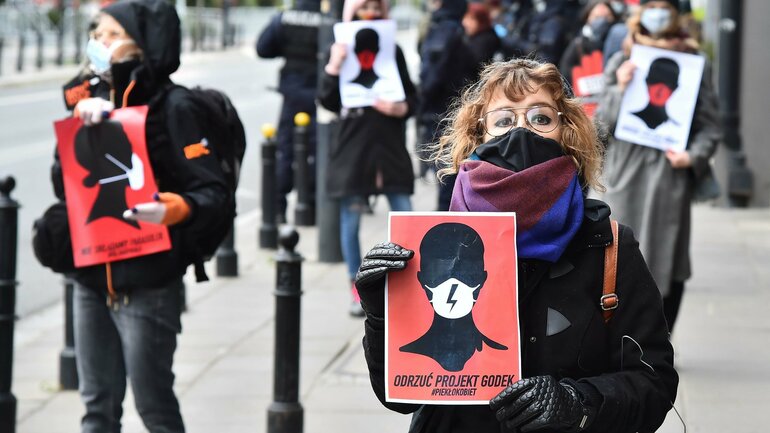Poland’s creative civil society in times of Covid-19

On 8 May, two days before a presidential election was due to take place in Poland, Gazeta Wyborcza, the country’s leading daily newspaper, published an interview starting with the words ‘There is no civil society in Poland’. The statement’s author argued that ‘in any other country in Western Europe’, developments like those taking place in today’s Poland would be met with a wave of street protests, resulting in the ruling authorities being ‘swept away’.
The idea that civil society has always existed in Western Europe but never really in Central and Eastern Europe is not new. In the 1990s and 2000s, low numbers of NGOs were often used as proof of a lack of civil society in Eastern Europe’s post-socialist states. Now, social movements and popular protest play the same role in such comparisons.
Yet, research for the MOBILISE project and other projects at ZOiS shows that in countries like Poland, counting NGOs or protest movements does not give an accurate impression of the condition of local civil society—or the broader activist scene. People engage in many different forms of activism and, for various reasons, refrain from joining NGOs or public protests.
Even before the Covid-19 pandemic, some interviewees said that they did not join protest movements because they felt insecure in crowds or thought that mass gatherings of any type were not safe for their children. Such concerns are even easier to empathise with from today’s perspective. It is also worth noting that among those who decided not to participate in public protests or work for charities or NGOs, many found other ways to be socially active. Some engaged in artistic initiatives, others in direct, informal help for those in need. Some people joined informal groups or took part in ad hoc events aimed at changing their surroundings one little bit at a time.
Protest in times of the pandemic
Covid-19 has had an effect on protest culture and activism worldwide. Many social movements have moved online, while multiple new forms of activism and protest have emerged.
In Poland, where public gatherings have been prohibited since 25 March, protesters and activists have adapted creatively to the new reality. For instance, when the government announced that it would yet again discuss a bill to tighten the country’s already strict abortion law, this sparked all types of reactions: social media posts with hashtags such as #maskatonieknebel (a mask is not a gag), icons for profile photos, protests in shopping queues, a large protest of drivers and cyclists, and other actions.
In many cities, citizens agreed to go shopping in specific shops at a given time, respecting physical distancing rules but wearing banners or black umbrellas, which have become a recognised symbol of women’s protest. In the centre of Warsaw, women and men drove and cycled while waving posters, flags, and black umbrellas in a spectacular convoy. In Łódź, activists set up a stall providing free face masks, calling their event A mask is not a gag and using the hashtag #polskiepiekło (Polish hell). In doing so, they made a clear statement without formally calling a protest.
Stepping in to fill gaps
In parallel to protests, seasoned activists—as well as many people who did not seem to be active in civil society before—have stepped in to fill gaps in services normally provided by the state. Most notably, people across Poland started making face masks and giving them to underequipped hospitals. In Łódź, a Facebook group brought together over 2,000 people, who arranged the material, stitched together the masks, and distributed them to hospitals in need.
Meanwhile, local group Food Not Bombs reported on 26 May that since the beginning of the pandemic, it had produced and distributed 21,800 masks and given away 2,500 hot meals and food packs to the homeless. Among those who step in are often members of local minorities, migrants, or even refugees. A Polish-Indian community that cooks for medical staff, Sikhs in Warsaw who provide meals for the homeless, and Chechen refugee women who make masks are just three examples of these efforts.
Unregistered protests, groups that formally exist only on social media, people who may be unable to join street demonstrations but are eager to help others when they feel they are needed—cases like these have all come to fore in the current crisis, but they are not new. Refocusing on such hard-to-quantify engagement allows for a better understanding of East European civil society, which is often different from, but not necessarily less developed than, its Western counterpart.
Piotr Goldstein is a social scientist and a researcher at ZOiS.
This text includes research results of the MOBILISE project, which is funded by the German Research Foundation (DFG).